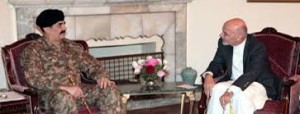
Islamabad/Kabul, Feb 19 – After more than a decade of war, formal talks between the Afghan government and the Taliban will begin in the coming weeks, the country’s president has told key aides.
According to a senior government official, the president, Ashraf Ghani, believes meetings could begin in early March after Pakistan signalled its support for the move.
Previous western-sponsored attempts to get Afghan government and Taliban representatives around the same table failed under Ghani’s predecessor, Hamid Karzai.
Although the Afghan Taliban’s spokesman denied there were any plans for talks, hopes are rising following Pakistan’s decision to pressurise the insurgent leadership.
On Tuesday, Gen Raheel Sharif, Pakistan’s powerful military chief, travelled to Kabul to tell Ghani the Taliban were increasingly amenable to discussions.
Pakistan has considerable influence over the Taliban, a movement that was supported by Islamabad in the 1990s and which since 2001 has been free to use Pakistani territory to launch attacks against the western-backed government in Kabul.
Since becoming president last year, Ghani has worked assiduously to secure Pakistan’s help in bringing the Taliban to the negotiating table by addressing Pakistani fears that Afghanistan is a base for its enemies.
Ghani has won plaudits from Islamabad by putting on a hold an arms deal with Pakistan’s arch-rival India and by deploying troops against anti-Pakistan militants based in Afghan territory.
In return Ghani expects Pakistan to tell the Taliban to enter negotiations and drastically reduce the surge in militant attacks inside Afghanistan.
Sartaj Aziz, the foreign affairs adviser to Pakistan’s prime minister, said reports of an immediate breakthrough were premature but that progress had been made amid the “quite unprecedented” improvement in relations between Afghanistan and Pakistan.
“These things have been going on for the last few weeks,” he said, referring to contacts between Taliban and the Afghan government. “We suggest the right kind of people to talk to and that kind of thing, but this is an Afghan-led process.”
Pakistan has also been pressured to bring the Taliban to the negotiating table by powerful ally China, which is alarmed by the overspill of militancy in the region into western China.
Previous attempts to find a political solution to the 13-year war in Afghanistan came to nothing. In 2013, the Taliban was allowed to open an “office” in Doha, the capital of the Gulf state of Qatar, where talks could be held.
But the process collapsed before it could begin after the Afghan government reacted furiously to the Taliban being allowed to raise their flag over the building as if it was the embassy of a sovereign power.
On Thursday, the US embassy in Kabul denied reported claims by Afghan Taliban sources that insurgent leaders would hold an initial round of talks with US officials as early as Thursday.
“There is no truth to the reports of US involvement in direct talks with the Taliban,” a US diplomat said.
Ajmal Obaid Abidy, spokesman for Ghani, said the international community had accepted demands that peace talks be conducted between the Afghan government and the Taliban, not with outside actors. So the reports of directs talks between the US and the Taliban, Abidy said, “are only rumours”.
Michael Semple, one of the world’s experts on the movement, said Doha was the most likely site of any talks as the Taliban’s “political commission” is already based there.
But he warned there was no guarantee talks would succeed given the Taliban have ramped up attacks in recent months.
“I don’t think we’ve seen the signs on the Taliban side that they are preparing to end the war,” he said. “Maybe there will be a round of talks, but the real test will be whether there will be another spring military campaign.”
Afghan analysts say Ghani will not be able to sustain his tilt towards Pakistan, which is proving unpopular with sections of the public, unless he is rewarded with a sharp decline in violence.
This week Ghani attempted to sooth the concerns of powerbrokers, including former president Hamid Karzai, who was famously distrustful of Pakistan.
“Ghani’s biggest challenge is if the coffins keep coming,” said Bilal Sarwary, one of the country’s top journalists. “But the Taliban have only been preparing to fight.”

